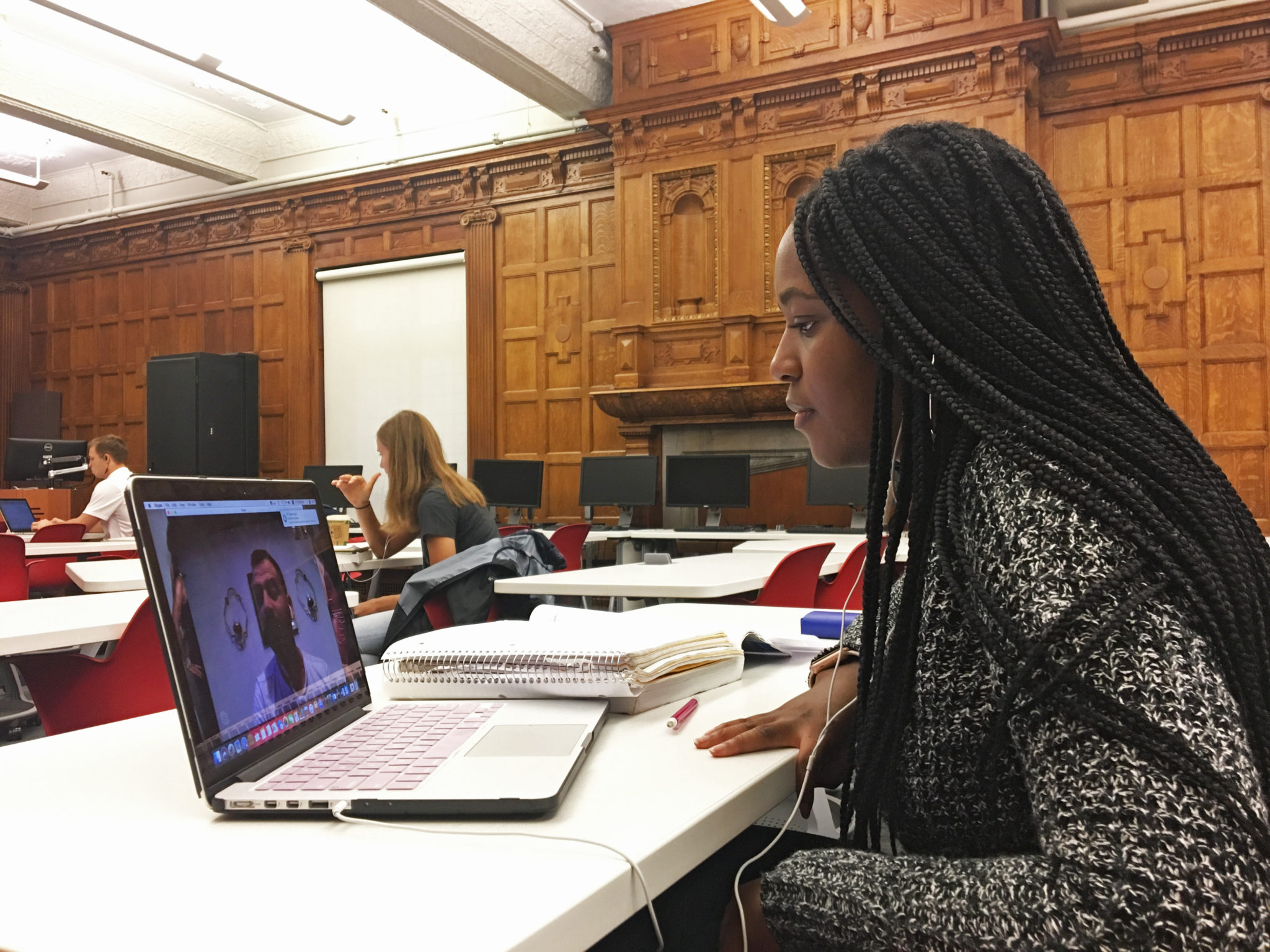
Many of Yale’s language programs offer opportunities for students to practice their language skills with others over lunch at designated “language tables.” But for the first time, the Arabic program is facilitating conversations between students and displaced people who are native Arabic speakers.
Elisabeth Siegel ’20, a student taking intermediate Arabic, first met Rasha over Skype. Siegel called Rasha from a Yale classroom, and Rasha answered from Lebanon –– the country to which she moved seven years ago after being displaced from Syria.
“It went really well,” Siegel said. “She’s very patient with me.”
The Conversation Partners program is a new initiative in Arabic lector Sarab Al Ani’s Arabic classes, which allows students to practice their skills while talking to native speakers through NaTakallam — a platform that connects displaced people with language learners. On designated Fridays in Al Ani’s L3 Intermediate Arabic and L5 Levantine Dialect Arabic classes, her students participate in 30-minute conversations with their respective language partners.
“This is the first year we’re doing this, but I can see how it is having a positive effect on my students not only in terms of language,” said Al Ani, “but also in the fact that these people are refugees and that [the students] are able to interact with them.”
Al Ani heard of NaTakallam, which schools such as Tufts University, Boston College and Columbia University already utilize, at a workshop and put in an application for the program in May 2018. Universities using the platform pay a fee to NaTakallam, and the platform then reimburses native speakers for their time, providing them with a revenue stream they might otherwise struggle to find in their respective host countries.
This semester, Al Ani received funding from the Council on Middle East Studies to provide each of her students with five half-hour sessions, during which the student can Skype with their native partner. Al Ani said that the Arabic program is the first language program at the Yale that gives students conversation opportunities through NaTakallam or related programs.
According to Minji Hong, a program coordinator for NaTakallam, the platform offers a variety of language-learning programs, only one of which is specific to universities. The company vets course instructors before providing access to some of the more than 60 conversation partners currently working with NaTakallam. Hong said that most of the conversation partners are displaced people and refugees from Syria, and many of them currently reside in Lebanon or Europe.
“We were wanting to change the narrative of refugees being passive aids recipients,” Hong said.
For Al Ani, her interest in the program was twofold. She said that it provides her students with an exceptional opportunity both to learn about cultures of the Arabian Peninsula and just to talk with native Arab speakers. She noted that for language learners, visiting the target country is ideal, but in certain cases, it can be expensive and unfeasible. She added that NaTakallam –– which literally translates into “We Speak” –– serves as an alternate method of learning.
Al Ani told the News that the speaking program aimed to help students understand cultural differences between them and their partners without paying too much attention to the fact that the conversation partners were displaced people.
“The reason behind that is that the intention is not to use their current status as a refugees — which is a temporary status — to stigmatize their lives, rather, give them the opportunity to be ambassadors of their culture,” she said, adding that the conversation partners were nevertheless welcome to share “examples based on their experience as refugees.”
Siegel’s conversation with Rasha on Friday centered around differences in their housing. Rasha described her apartment in Lebanon, which she shares with her husband and son, but she added that she would one day like a home with a garden. As a student taking intermediate Arabic, Siegel is not quite fluent, but she said that her 30-minute conversation with Rasha went by quickly.
Siegel said that while she is mainly focused on learning how to successfully conduct conversations in Arabic, the program offers a unique opportunity to interact with a native speaker beyond simply “exchanging pleasantries.”
Alyssa Ince ’20, another student in L3, said that the program has been “great” so far and gives students an opportunity to practice different dialects of Arabic.
NaTakallam offers Persian and Arabic conversation partners for universities and is hoping to expand to include Spanish speakers through work with displaced people from Venezuela, according to Hong.
Carly Wanna | carly.wanna@yale.edu .







